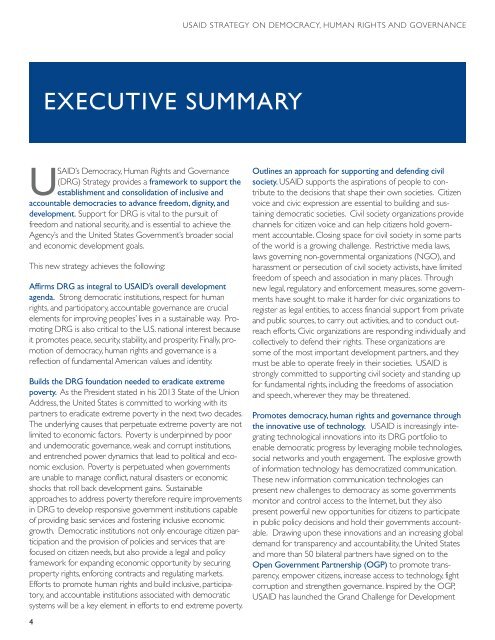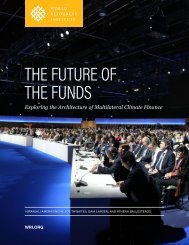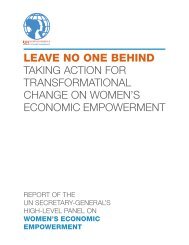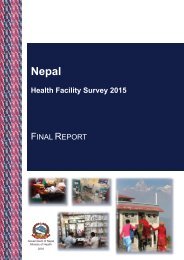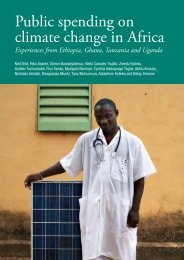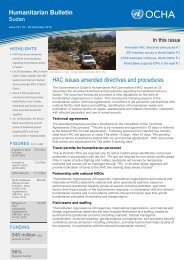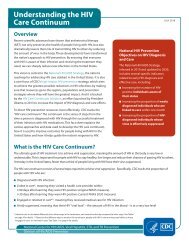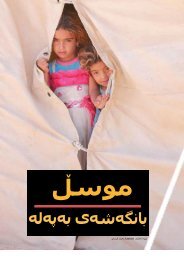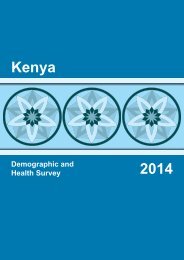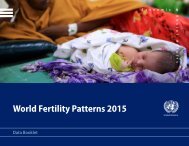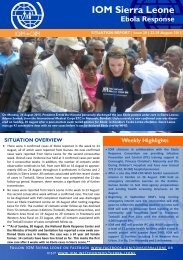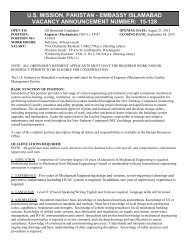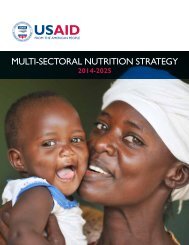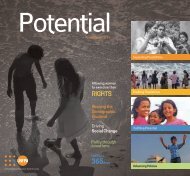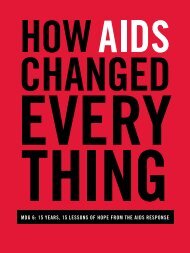<strong>USAID</strong> STRATEGY ON DEMOCRACY, HUMAN RIGHTS AND GOVERNANCEEXECUTIVE SUMMARY<strong>USAID</strong>’s Democracy, Human Rights and Governance(<strong>DRG</strong>) Strategy provides a framework to support theestablishment and consolidation of inclusive andaccountable democracies to advance freedom, dignity, anddevelopment. Support for <strong>DRG</strong> is vital to the pursuit offreedom and national security, and is essential to achieve theAgency’s and the United States Government’s broader socialand economic development goals.This new strategy achieves the following:Affirms <strong>DRG</strong> as integral to <strong>USAID</strong>’s overall developmentagenda. Strong democratic institutions, respect for humanrights, and participatory, accountable governance are crucialelements for improving peoples’ lives in a sustainable way. Promoting<strong>DRG</strong> is also critical to the U.S. national interest becauseit promotes peace, security, stability, and prosperity. Finally, promotionof democracy, human rights and governance is areflection of fundamental American values and identity.Builds the <strong>DRG</strong> foundation needed to eradicate extremepoverty. As the President stated in his 2013 State of the UnionAddress, the United States is committed to working with itspartners to eradicate extreme poverty in the next two decades.The underlying causes that perpetuate extreme poverty are notlimited to economic factors. Poverty is underpinned by poorand undemocratic governance, weak and corrupt institutions,and entrenched power dynamics that lead to political and economicexclusion. Poverty is perpetuated when governmentsare unable to manage conflict, natural disasters or economicshocks that roll back development gains. Sustainableapproaches to address poverty therefore require improvementsin <strong>DRG</strong> to develop responsive government institutions capableof providing basic services and fostering inclusive economicgrowth. Democratic institutions not only encourage citizen participationand the provision of policies and services that arefocused on citizen needs, but also provide a legal and policyframework for expanding economic opportunity by securingproperty rights, enforcing contracts and regulating markets.Efforts to promote human rights and build inclusive, participatory,and accountable institutions associated with democraticsystems will be a key element in efforts to end extreme poverty.Outlines an approach for supporting and defending civilsociety. <strong>USAID</strong> supports the aspirations of people to contributeto the decisions that shape their own societies. Citizenvoice and civic expression are essential to building and sustainingdemocratic societies. Civil society organizations providechannels for citizen voice and can help citizens hold governmentaccountable. Closing space for civil society in some partsof the world is a growing challenge. Restrictive media laws,laws governing non-governmental organizations (NGO), andharassment or persecution of civil society activists, have limitedfreedom of speech and association in many places. Throughnew legal, regulatory and enforcement measures, some governmentshave sought to make it harder for civic organizations toregister as legal entities, to access financial support from privateand public sources, to carry out activities, and to conduct outreachefforts. Civic organizations are responding individually andcollectively to defend their rights. These organizations aresome of the most important development partners, and theymust be able to operate freely in their societies. <strong>USAID</strong> isstrongly committed to supporting civil society and standing upfor fundamental rights, including the freedoms of associationand speech, wherever they may be threatened.Promotes democracy, human rights and governance throughthe innovative use of technology. <strong>USAID</strong> is increasingly integratingtechnological innovations into its <strong>DRG</strong> portfolio toenable democratic progress by leveraging mobile technologies,social networks and youth engagement. The explosive growthof information technology has democratized communication.These new information communication technologies canpresent new challenges to democracy as some governmentsmonitor and control access to the Internet, but they alsopresent powerful new opportunities for citizens to participatein public policy decisions and hold their governments accountable.Drawing upon these innovations and an increasing globaldemand for transparency and accountability, the United Statesand more than 50 bilateral partners have signed on to theOpen Government Partnership (OGP) to promote transparency,empower citizens, increase access to technology, fightcorruption and strengthen governance. Inspired by the OGP,<strong>USAID</strong> has launched the Grand Challenge for Development4
<strong>USAID</strong> STRATEGY ON DEMOCRACY, HUMAN RIGHTS AND GOVERNANCEMaking All Voices Count (MAVC) in partnership with U.K. Departmentfor International Development (DFID), the SwedishInternational Development Cooperation Agency (SIDA), andOmidyar Network. This initiative will support innovative solutionsto amplify the voices of citizens and to enablegovernments to listen and respond, with the goal of fosteringmore democratic and effective governance, particularly inemerging democracies.Adopts a more cohesive, goal-oriented framework. This newstrategy moves beyond <strong>USAID</strong>’s existing framework thatfocuses on which institutions we are strengthening: 1) civilsociety; 2) governance; 3) elections and political processes; and4) rule of law. The strategy adopts new objectives that articulatethe higher-level outcomes the Agency is seeking to achieve.Two critical outcomes envisioned by this strategy are greatercitizen participation and inclusion, and more accountable institutionsand leaders. This new focus on core concepts willfacilitate <strong>DRG</strong> programming that breaks down existingstovepipes and encourages innovation and integration across<strong>DRG</strong> component areas of work.Elevates human rights as a key <strong>USAID</strong> development objective.<strong>USAID</strong> has a long history of supporting human rights under avariety of reporting labels, including rule of law, civil society, vulnerablepopulations, property rights and access to justice. Thisstrategy makes human rights an explicit component of theAgency's approach to democratic development. It builds on<strong>USAID</strong>’s existing portfolio of human rights programming, whileelevating human rights, including economic, social and culturalrights, as a critical element of a development strategy that leveragesthe inclusion and dignity of all. <strong>USAID</strong> places particularemphasis on inclusive development, expanding rights andopportunities for women, persons with disabilities, displacedpersons, LGBT persons, indigenous peoples and other historicallymarginalized populations, including ethnic and religiousminorities.Additionally, this strategy enshrines the prevention ofhuman rights abuses as an important part of human rights programming.Encourages integration of <strong>DRG</strong> principles and practices intoother development sectors. Obstacles to economic and socialdevelopment are not only technical in nature; they are rootedin the political economy of a country. Therefore, technicalefforts to promote poverty reduction and socioeconomicdevelopment must address democracy, human rights and governanceissues, including a lack of citizen participation and poorgovernment accountability. Based on growing evidence of therelationship between <strong>DRG</strong> and socioeconomic progress, thisstrategy outlines an approach to integrating <strong>DRG</strong> throughoutall of the Agency’s areas of focus. At the same time, it acknowledgesthe importance of better integrating economicgovernance work into relevant <strong>DRG</strong> programs and activities.The strategy describes <strong>DRG</strong> concepts and tools that can beleveraged to enhance outcomes in support of the three corepresidential development initiatives, Feed the Future, Global ClimateChange, and the Global Health Initiative as well as otherdevelopment sectors.Defines a country-based strategic approach to applying thisstrategy. A country’s political trajectory and context are amongthe most significant factors in determining the core <strong>DRG</strong> challengesand opportunities that exist in a country. Therefore, byconsidering the political context in their country, Missions canbegin to identify the high level <strong>DRG</strong> strategic issues that theywill likely face. This strategy establishes four country contextsand three overarching characteristics to help guide strategicplanning. However, to develop a truly effective strategy, to makefully informed decisions on focus and selectivity, and to lay thefoundation for the design and implementation for effective programs,a rigorous <strong>DRG</strong> assessment and separate social-sectorpolitical economy analysis is recommended.This strategy takes into account the development parametersarticulated by the <strong>USAID</strong> Forward reform agenda. 1 In particular,the principles of selectivity and focus will underpin all future<strong>DRG</strong> interventions. With respect to selectivity, this strategyarticulates a framework to identify when <strong>DRG</strong> resources canbe phased out.The strategy also encourages focus by guidingthe investment of resources within the <strong>DRG</strong> sector to wherethey are likely to have the greatest impact, given the countrycontext. Rather than identifying global priorities, focus will occurwithin countries, as Missions carefully tailor activities to the particularchallenges and opportunities they face. Given thediversity and context-specific nature of <strong>DRG</strong> gaps, the strategyencourages country-level assessments to identify particularneeds, and to focus on programs most likely to have a lastingand measurable impact. Both principles recognize that there isnot sufficient funding to meet all needs.Accordingly, <strong>DRG</strong> programmersmust plan their interventions with a deepunderstanding of country dynamics and opportunities for genuinereform as outlined in this strategy.This strategy also supports <strong>USAID</strong> Forward by outlining arationale and approach to support local solutions.Accountableand participatory partner country systems, which include governmentministries, parliaments and judiciaries, as well as media,civil society and private sector actors, form the foundation1<strong>USAID</strong>, <strong>USAID</strong> Policy Framework: 2011-2015 (Washington DC: <strong>USAID</strong>, 2012).5
- Page 2: America does not presume to know wh
- Page 10 and 11: USAID STRATEGY ON DEMOCRACY, HUMAN
- Page 12 and 13: USAID STRATEGY ON DEMOCRACY, HUMAN
- Page 14 and 15: USAID STRATEGY ON DEMOCRACY, HUMAN
- Page 16 and 17: USAID STRATEGY ON DEMOCRACY, HUMAN
- Page 18 and 19: USAID STRATEGY ON DEMOCRACY, HUMAN
- Page 20 and 21: USAID STRATEGY ON DEMOCRACY, HUMAN
- Page 22 and 23: USAID STRATEGY ON DEMOCRACY, HUMAN
- Page 24 and 25: USAID STRATEGY ON DEMOCRACY, HUMAN
- Page 26 and 27: USAID STRATEGY ON DEMOCRACY, HUMAN
- Page 28 and 29: USAID STRATEGY ON DEMOCRACY, HUMAN
- Page 30 and 31: USAID STRATEGY ON DEMOCRACY, HUMAN
- Page 32 and 33: USAID STRATEGY ON DEMOCRACY, HUMAN
- Page 34: USAID STRATEGY ON DEMOCRACY, HUMAN
- Page 37 and 38: USAID STRATEGY ON DEMOCRACY, HUMAN
- Page 39 and 40: USAID STRATEGY ON DEMOCRACY, HUMAN
- Page 41 and 42: USAID STRATEGY ON DEMOCRACY, HUMAN
- Page 43 and 44: USAID STRATEGY ON DEMOCRACY, HUMAN
- Page 45 and 46: ANNEX I1I. BUILDING ON THELAST 20 Y
- Page 48: U.S.Agency for International Develo


